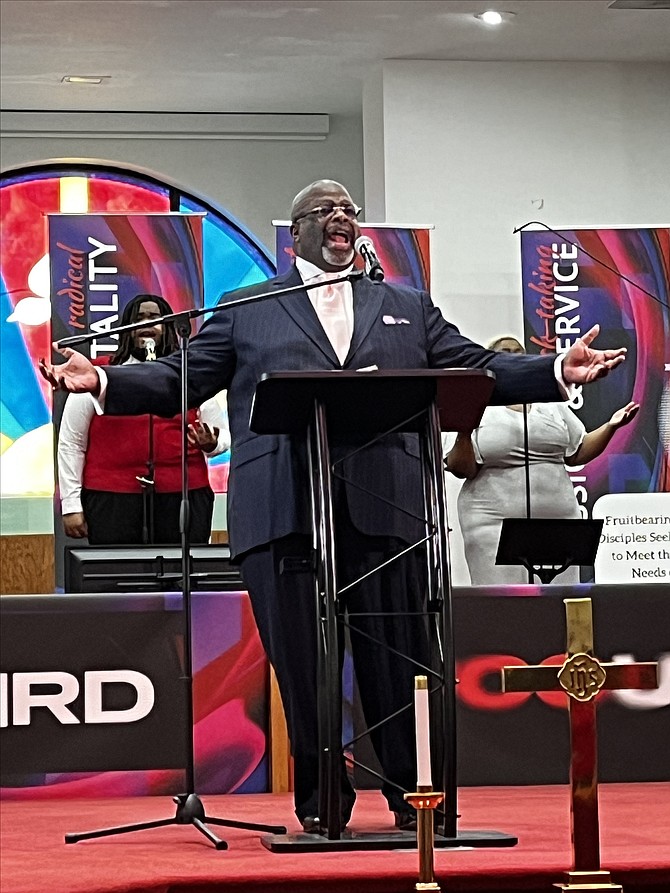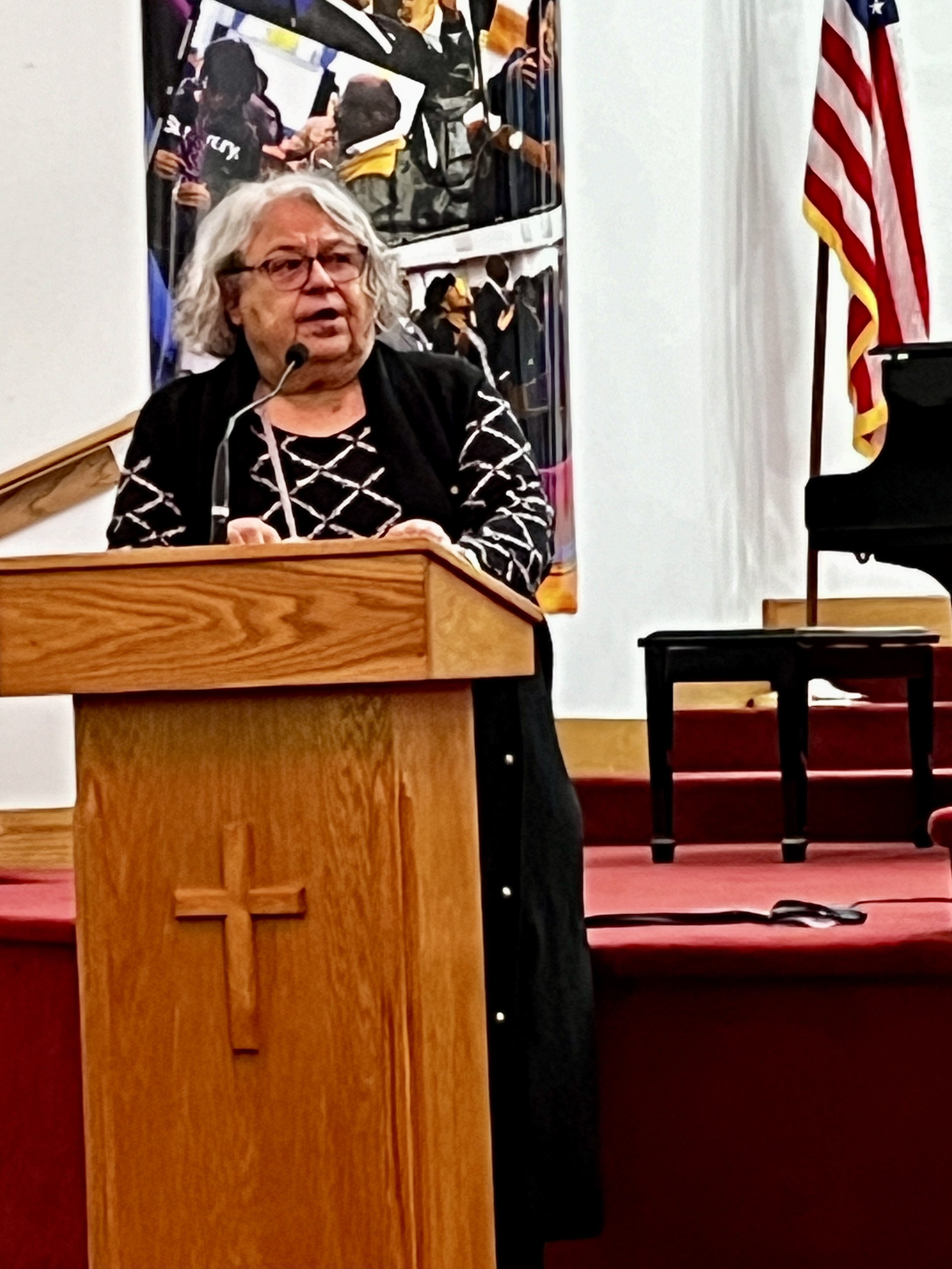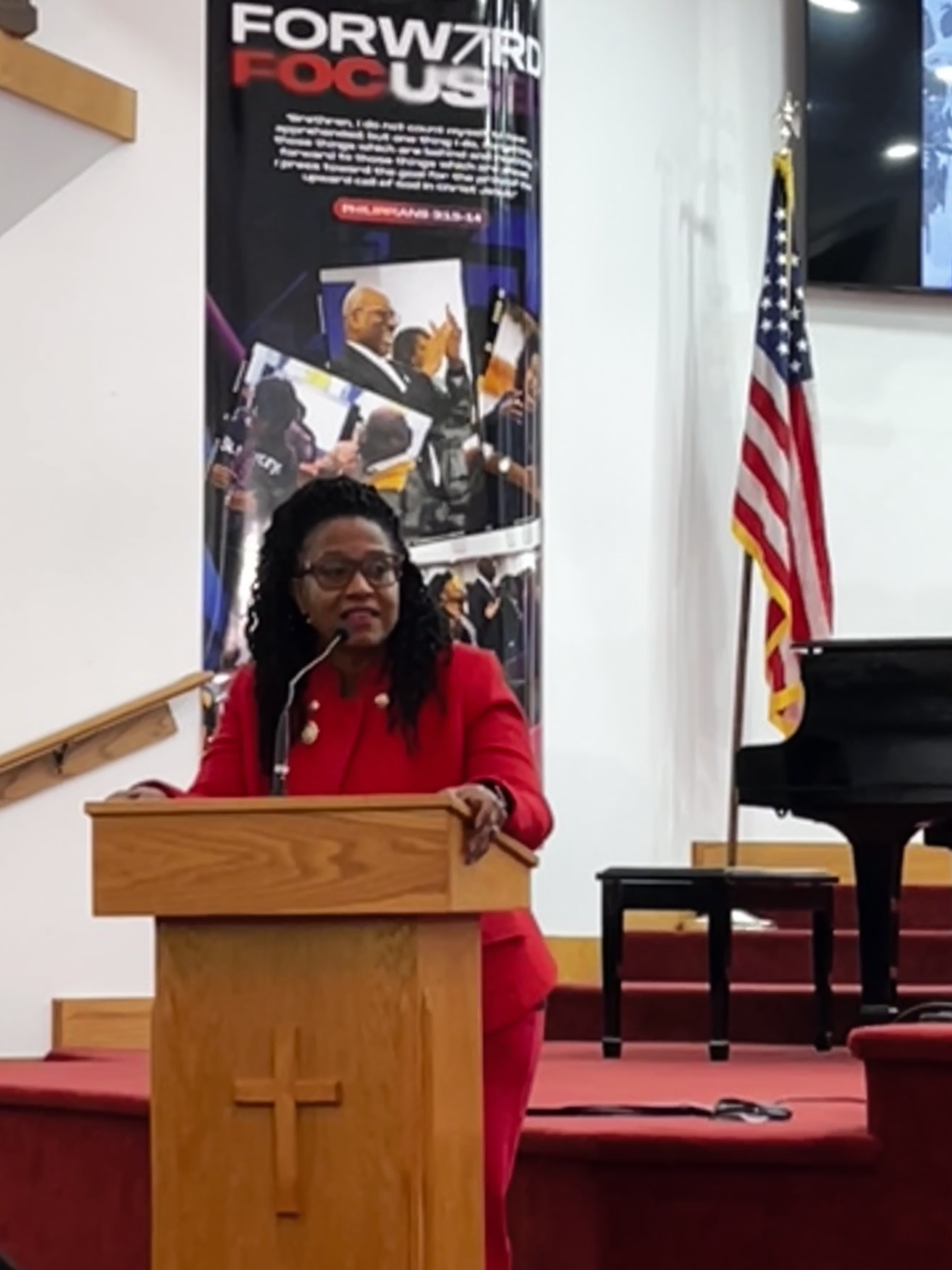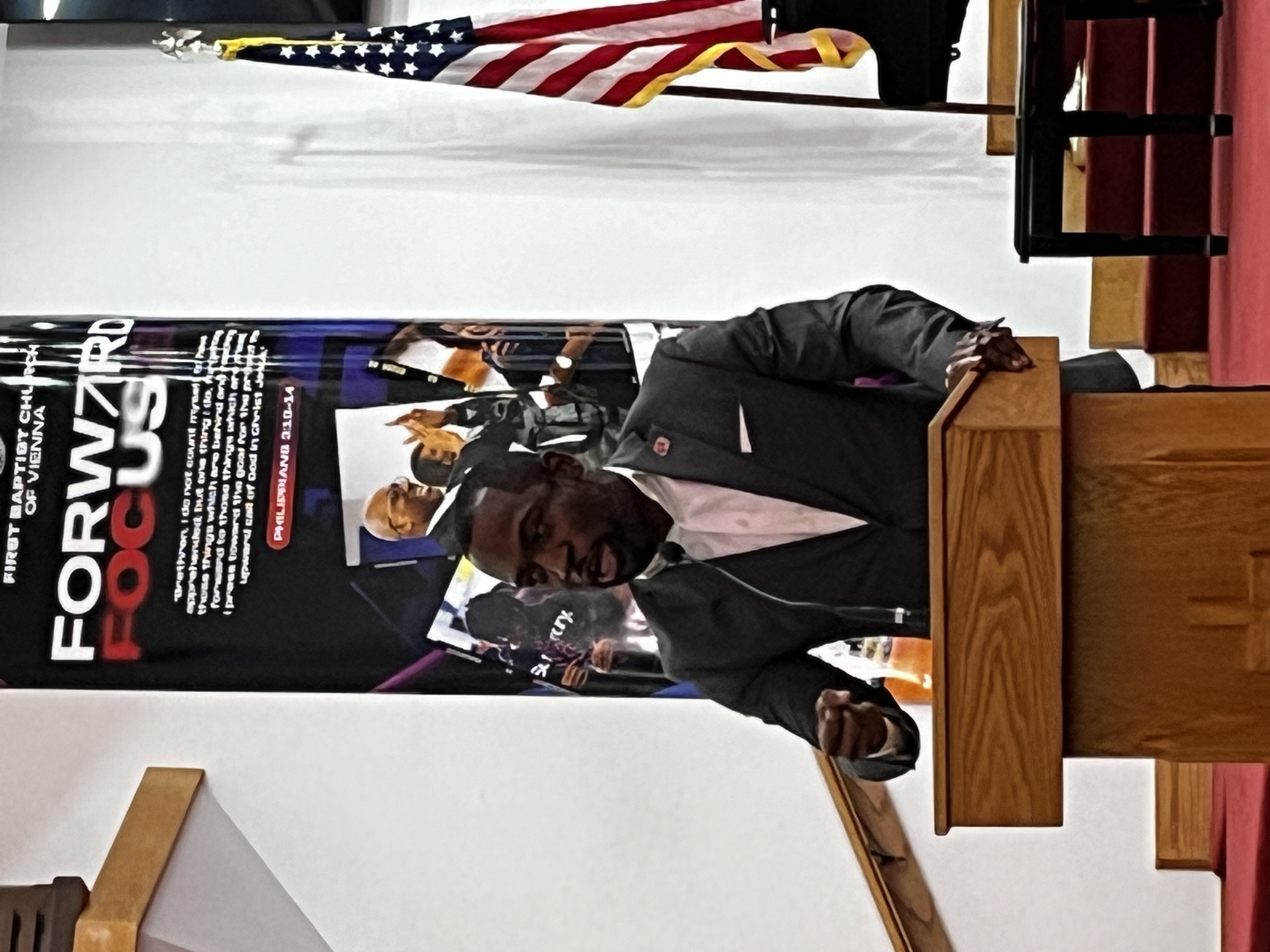The 8th annual Legislative and Justice Sunday occurred on Feb. 11 at the First Baptist Church of Vienna. Congregants and guests joined in person and through a live broadcast. State, county and local legislators filled three rows, with eight invited to speak during the service.
Minister Hazel Wynn opened with a prayer. She emphasized the importance of social justice by recalling the struggles for equality and fairness that have come before and those that are now underway.
It being Super Bowl Sunday, Wynn illustrated her point with a video and reference to NFL quarterback Colin Kaepernick formerly of the San Francisco 49ers. In 2016, Kaepernick took a knee during the national anthem, protesting police brutality and racism. There were more than a dozen shootings of unarmed Black men around the country in 2016. Kaepernick said, “It would be selfish on my part to look the other way. There are bodies in the street, and [police] getting paid leave and getting away with murder."
Dr. Vernon C. Walton, senior pastor, preacher, and advocate, said the video captures how they celebrate this particular Sunday morning with a conversation that began nationally and transcended to conversations in Fairfax County and Virginia.
“Jesus Christ Himself said, I’ve come so you might have life and have it more abundantly,” Walton said. Abundance does not translate to money but to access to healthcare, education, housing, and safety, Walton said.
“There is no difference between my school and your school because of the color of my skin or the zip code. ... Abundance suggests ... I too am able to drive my car down the street and go to the mall, and have a reasonable expectation that my child and I are able to return home. Abundance suggests that I spent a week working [and] that I'm able to make enough to provide a roof over my head," Walton said.
Walton acknowledged the weight of the responsibility in the daily decision-making process wears him down. He spoke of how Jesus calls for accountability in stewardship in the Gospel of Matthew.
Today, it is how one treats the poor and marginalized, Black and brown people, women, LGBTQ, and everyone else, he said. There is importance in seeing and appreciating people’s full humanity rather than focusing on their brokenness or classes.
Our actions toward others reflect actions toward Him. “He will ask, and inquire of us, ‘How did you handle the poor … the homeless and unhoused … the educational tests that are within our system … What difference have you made? What solutions have you offered,” Walton preached.
Walton asks: “Are you satisfied with: 60,000 [Fairfax County] residents experiencing food insecurity, … more than 1,200 unhoused, … 15 percent of the student population at Northern Virginia Community College being homeless? Are you satisfied with the proposed state budget offered five days before Christmas that cut $10 million from permanent supportive housing, … [banning books] that tell the story and journey of the people who’ve made significant contributions back to America?”
Affordable Housing:
Mary Paden serves on Fairfax County’s Affordable Housing Advisory Council as a representative of the Fairfax NAACP, of which she is the Housing Committee’s chair. Speaking on behalf of the NAACP, she updated the county’s affordable housing initiatives and detailed their challenges and the fallacy of the “trickle-down” economic theory. Paden told of racial disparities in the criminal justice system contributing to Black people being incarcerated and impacting their lives when returning to society. And she shared solutions.
“Rents are up; property values are up, meaning property taxes are up. It’s hard to buy; it’s hard to rent. It’s hard to live in Fairfax County; a lot of people are moving out,” Paden said.
According to Paden, there is a flawed belief that by increasing the supply of high-end housing, the market will eventually trickle down to more affordable housing, making it more accessible to lower-income buyers. Creating housing that is more accessible to lower-income buyers must be more effective in facing resistance from the local community.
‘The suburbs were created for a reason," Paden said. You all know what that is, and they want it to stay that way.” Paden said. “We need community support.”
According to Paden, the county’s housing committee also expresses concern for those currently experiencing homelessness. She said that while Black individuals make up ten percent of the overall population of Fairfax, they constitute a far higher proportion of the homeless population, accounting for 50 percent.
The inequities seen in the county's criminal justice system have resulted in a significant number of Black individuals being imprisoned and then released as returning people.
They can't rent an apartment, get a job, or get back into society. Paden characterized it as a “free fall” for the individuals, resulting in them being at “the bottom of the barrel. … It is a big problem," and preventing individuals from being homeless is one method to combat it.
Paden referred to the availability of tax credits for developments that incorporate affordable housing units. She advocated for the current tenant bills, giving tenants more rights so landlords do not exploit them and "more support at eviction court from legal aid lawyers.” The legal aid lawyers and the State Housing Trust Fund require financial support. The funding has increased compared to previous levels, yet more is needed.
According to Paden, the most effective way to accomplish these tasks is to contact lawmakers personally. “I encourage all of you to email me at housing@fairfaxnaacp.org,” she said.
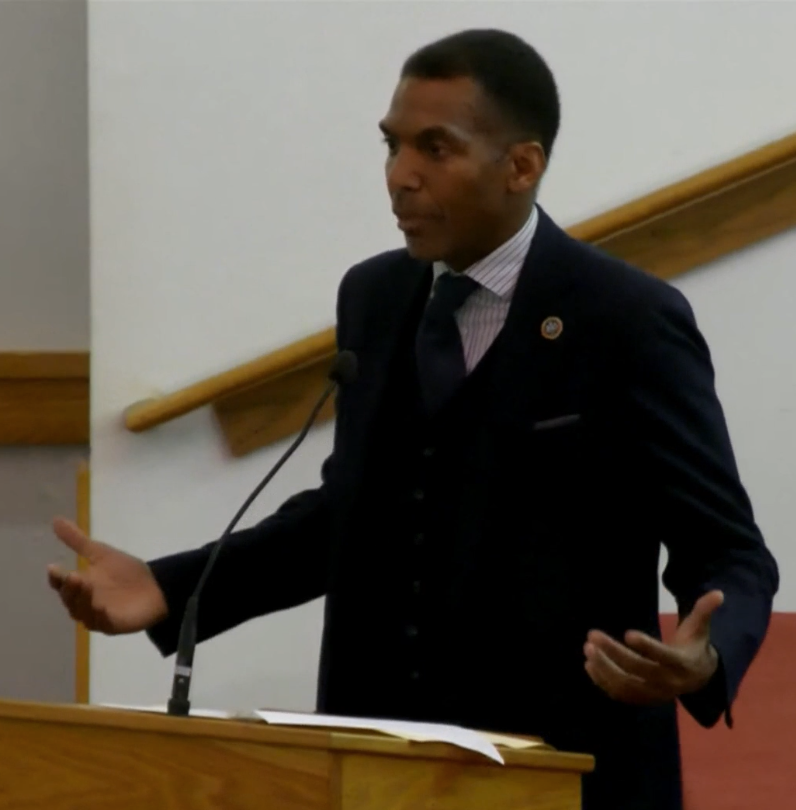
Public Safety
Supervisor Rodney Lusk (Franconia), chair of the board’s public safety committee, recounted growing up under his grandparents' care and values and his experience as a public servant.
Lusk cited the three valuable teachings his grandparents imparted to him. One, if you say you are going to do something, you have to do it. Two, if you live in a community, you have the responsibility to serve that community. And, if you see someone suffering, if you see someone in need, you have the responsibility to help them, Lusk said.
Lusk provided an overview of the committee’s accomplishments since 2020. Following the police murder of George Floyd and nationwide and local protests, Lusk, Chairman Jeff McKay and others solicited community input and received hundreds of responses recorded in a matrix.
An early recommendation was to implement police body worn cameras, which have proven beneficial for transparency and accountability, Lusk said.
Lusk with Supervisor Walter Alcorn put together a co-responder motion that the board approved. “We’re talking about the very beginning of the process of the 911 dispatch; we have to figure out if people have mental health or substance abuse issues. We're going to send a trained clinician out with a police officer to help them,” he said.
In 2023, Lusk created the Police Reform Matrix Working Group which reviewed the community input and developed a proposed action plan.
The Matrix Working Group took hundreds of recommendations recorded in the matrix. After synthesizing them down to 50, Pastor Walton presented the committee's findings to the public safety committee.
Lusk said that the police department is, as a result of that matrix, in the process of changing the General Order that deals with the pointing of a firearm. “We're going to now look at a way to capture and record that as a reportable use of force,” Lusk said.
In addition, they created the Courthouse Self-Help Resource Center inside the Public Law Library. The public, on an ad hoc basis, can access informational materials, forms, and legal resources and receive referrals to legal services or other agencies and services that may be available, among other things. “There are people who don't understand the language, going into the courts, and they have no idea what's being said in the courtroom,” Lusk said.
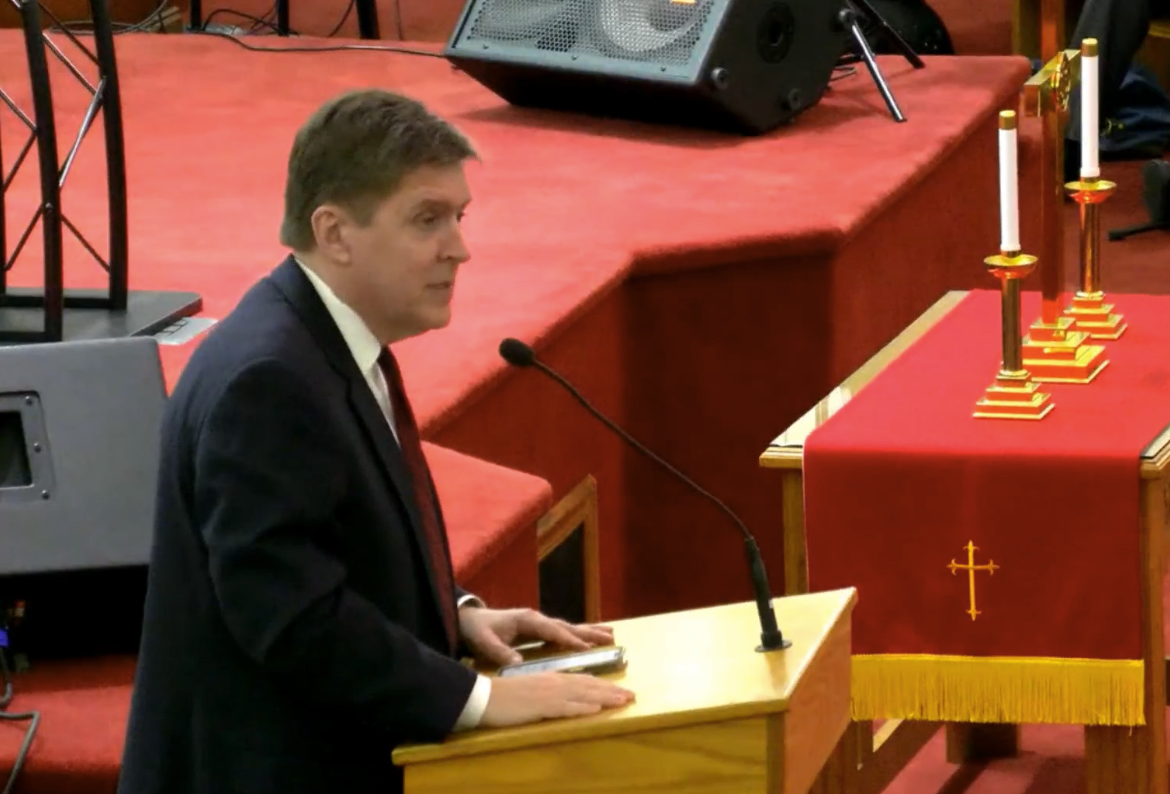
Casinos: Supervisor Walter Alcorn (Hunter Mill) expressed concern over possible casino development in Fairfax County; he emphasized the need for a more inclusive economy and called for limits on political donations.
Alcorn asked if anyone in the congregation was for casinos; no one raised their hand. Alcorn said, ”The point is, we didn't ask for it. This is not something that Fairfax County Board of Supervisors asked for.” Alcorn questioned whether a casino economy is one the community wants or one based on productive jobs and focusing on an inclusive economy.
According to Alcorn, a lot of money is being thrown around in the General Assembly, and he is concerned about the bill being pushed through the General Assembly in 2025. The good news is, not this year, but they will have to wait for it to come through in 2025.
Alcorn warned that those driving the casino issue will continue to raise more and more dollars. “You shouldn’t be able to buy the government. … Somebody shows up and puts hundreds of thousands of dollars into my colleagues' political pockets in the General Assembly. … This is just not right. … I guarantee you the folks that are throwing around that kind of money, they're not thinking about the least of us.”
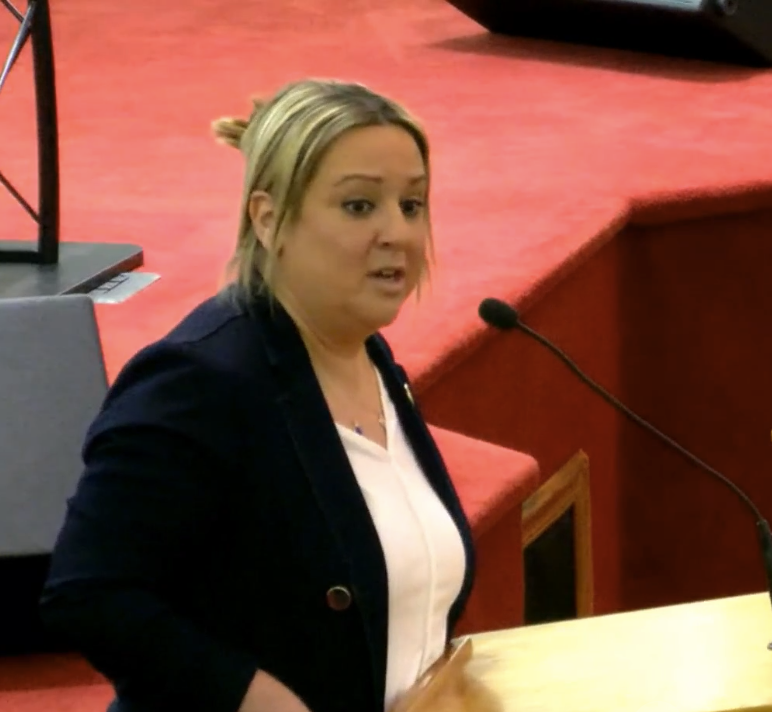
Prison Reform
Del. Holly Siebold (D-35) advocated for prison reform in Virginia, focusing on living conditions, medical care, solitary confinement, and canine use. Virginia spends $1.5 billion a year to incarcerate people, and it is “not necessarily given any oversight.” She said living conditions for those incarcerated are dismal and there is a lack of medical attention. The inhumane use of canines in Virginia prisons accounts for 92 percent of bites happening in the country. Prisons are using solitary confinement.
Siebold said legislators need to make sure they are working toward making those conditions better. She told of hearing from families of those incarcerated at Virginia’s super-maximum security confinements, Keen Mountain Correctional Center, and Red Onion State Prison concerned about black mold among other issues.
Siebod said drugs in Virginia’s prison system have gotten “out-of-control.” Chadwick Dotson, director of the Virginia Department of Corrections, “has admitted that drugs are getting in through staff,” according to Siebold. “So we need to be holding those people accountable,” Siebold said.
Siebold advocated for providing educational programs and second chances for inmates. Incarceration shouldn't be punitive; people will make mistakes, and that worst day should not reflect the rest of their lives. “Ninety percent of those who are incarcerated come back into society, and we need to make sure that we have programs set up to help them reenter society,” Siebold said.
Student Homelessness and Maternal Health Disparities
Del. Karen Keys-Gamarra (D-7) reviewed four bills as chief patron. Keys-Gamarra said one of her proudest moments was when [HB 168] passed the House. It provides appropriate support and services to students experiencing homelessness. Her second bill, HB 166, provides guidance and resources for composting programs in local school divisions. HB 974 dealing with worker’s compensation is presumptive that certain injuries arise out of employment unless overcome “by a preponderance of competent evidence to the contrary.”
HB 171 relates to petitions, signing pleadings, motions, and other papers, oral motions, and sanctions. Keys-Gamarra said she introduced HB 169 Maternal Health Data and Quality Measures, Task Force on State Health Commissioner to reestablish. “because the numbers of people of color and the death rates of not only our mothers but our babies are astronomically high in an unjustifiable way.”
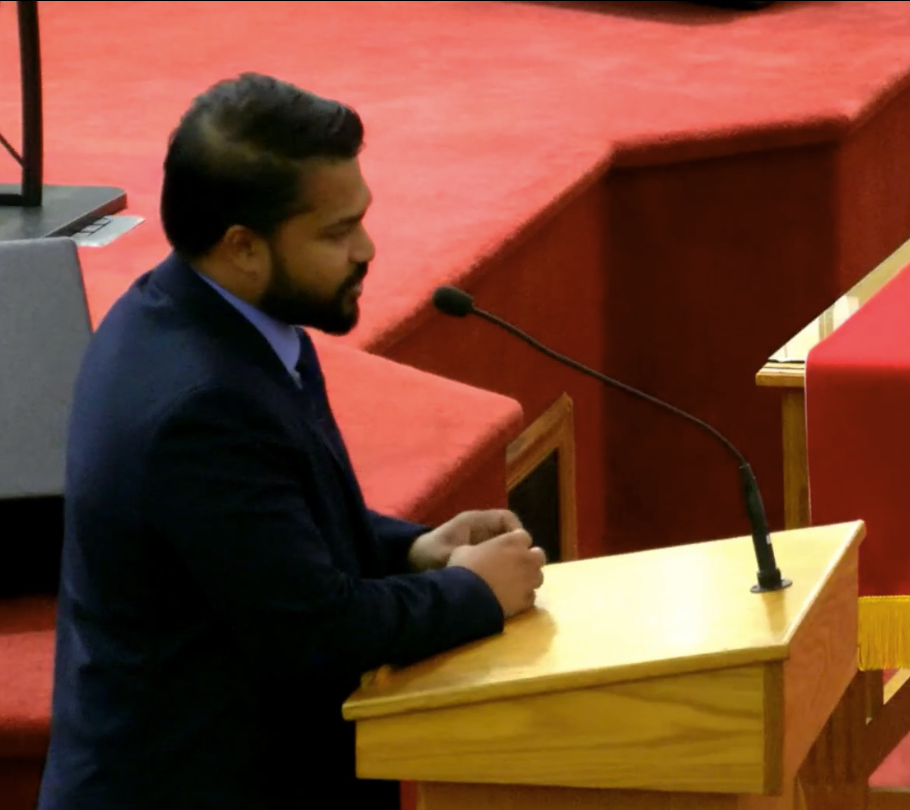
Gun Violence
Sen. Saddam Azlan Salim (D-37) discussed several pieces of legislation as chief patron related to gun violence prevention, including SB 319 Firearms: purchase, possession, or transportation of firearm following an assault and battery against a person in a dating relationship with the alleged offender, penalty following an assault & battery against a person in dating relationship is guilty of a Class 1 misdemeanor. Salim’s legislation, passed in the Senate, changed it from 365 days to 364 days.
“It took a lot to explain to people why,” Salim said. This avoids a federal immigration law that triggers an automatic deportation at 365 days. “So by doing that, we avoid a lot of good folks that are paying their taxes, they've been here for a while, from getting deported to a nation that they do not belong to,” he said.
His other legislation includes SB 55 Firearms; waiting period for purchase, penalty: Provides that no person shall sell a firearm unless at least three days have elapsed from the time the prospective purchaser completes the written consent form to have a licensed dealer obtain criminal history record information. SB 57 Concealed handgun; carrying onto the premises of any restaurant, penalty makes it a misdemeanor for anyone to carry a concealed handgun onto the premises of any restaurant or club for which the Virginia Alcoholic Beverage Control Authority has granted a license to sell and serve alcoholic beverages for on-premises consumption, except active and qualified retired law enforcement officers.
SB 327: Firearms; age requirement to purchase, penalty: prohibits any person under 21 years of age from purchasing a firearm, with exceptions for law enforcement, members of armed forces, and National Guard. SB 338 Gun violence instructs JLARC to study effects on communities.
Salim said that as a first-term senator, he realized that many policy changes would be tough, and that's where community input is necessary. He requested the public to send him an email.
City of Richmond Mayor Levar Stoney (D), who is running for Virginia governor, shared his achievements in justice and education, including restoring voting rights to returning citizens and increasing funding for public schools. He emphasized the need for justice outside the church walls and called for collective action to bring about real change in Virginia.
